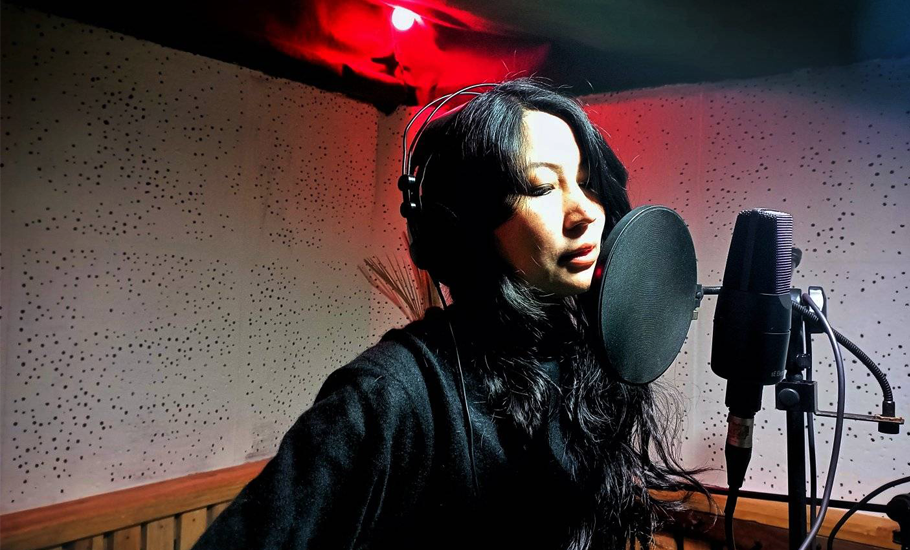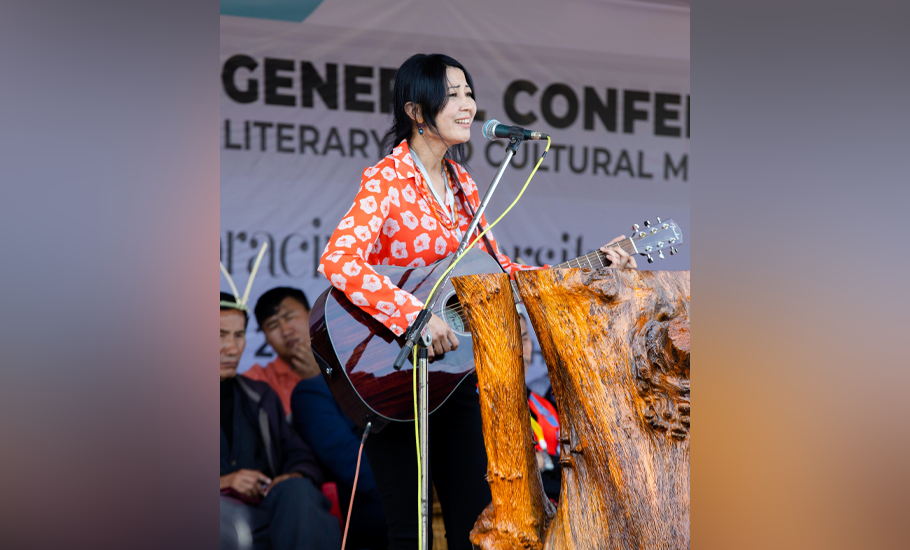
- Home
- News
- Analysis
- States
- Perspective
- Videos
- Education
- Entertainment
- Elections
- World Cup 2023
- Features
- Health
- Business
- Series
- Economy Series
- Earth Day
- Kashmir’s Frozen Turbulence
- India@75
- The legend of Ramjanmabhoomi
- Liberalisation@30
- How to tame a dragon
- Celebrating biodiversity
- Farm Matters
- 50 days of solitude
- Bringing Migrants Home
- Budget 2020
- Jharkhand Votes
- The Federal Investigates
- The Federal Impact
- Vanishing Sand
- Gandhi @ 150
- Andhra Today
- Field report
- Operation Gulmarg
- Pandemic @1 Mn in India
- The Federal Year-End
- The Zero Year
- Premium
- Science
- Brand studio
- Home
- NewsNews
- Analysis
- StatesStates
- PerspectivePerspective
- VideosVideos
- Entertainment
- ElectionsElections
- Sports
- Loading...
Sports - Features
- BusinessBusiness
- Premium
- Loading...
Premium

Healing through music: Why Theithei Luithui is singing tales of war and violence in Manipur

Theithei Luithui was 13 in 1994, the year her grandfather in a cruel turn of fate became a ‘collateral damage’ of a long-drawn war being waged in her homeland. The old man in his eighties was tending to his cattle near his home in Ukhrul in Manipur when a fierce gunbattle broke out between Naga militants and security forces. The octogenarian was hard of hearing. So, he did not realise...
Theithei Luithui was 13 in 1994, the year her grandfather in a cruel turn of fate became a ‘collateral damage’ of a long-drawn war being waged in her homeland.
The old man in his eighties was tending to his cattle near his home in Ukhrul in Manipur when a fierce gunbattle broke out between Naga militants and security forces.
The octogenarian was hard of hearing. So, he did not realise the turmoil unfolding only a few metres away until some splinters from the combat zone struck him.
He later succumbed to the splinter injuries.
It was the period when Ukhrul and other hill areas of Manipur were witnessing an unprecedented spurt in violence including the horrific Kuki-Naga ethnic clashes.
More than 1,000 people, including women and children, were killed in clashes, which spanned from 1992 to 1997, between the two tribes. Besides, many security force personnel, militants and unarmed civilians like Luithui’s grandfather died in the armed conflict.
Just for context, 55 security personnel were killed by NSCN (IM) militants in Naga-dominated areas of Manipur in 1994 alone.
Blood-curdling as it seems, the casualty statistics however did not capture the true magnitude of the humane tragedy and the indelible mark it left on the children growing up in that period in the beautiful hills of Manipur.

Luithui was one of the children who lived through the conflict. Her childhood memories were filled with trauma, sufferings and agony.
Channelising those powerful emotions lying buried in her subconscious, she developed a new genre of Tangkhul Naga folk music which covers stories of tragic past, love and tribal culture.
Her soulful songs are now even transcending language barriers to touch a chord with many outside the Tangkhul community who share a similar past in the region.
Not for nothing that she is now a regular feature in almost all the prestigious cultural and tourism festivals particularly in her home state Manipur.
She has performed in events such as Shirui Lily, Orange festival, Luingani to name a few. Besides she has churned out four albums containing around 10 songs each and a music video.
The teacher-turned musician has of late become active in her YouTube channel, which is getting encouraging tractions.
To understand the depth of her songs one needs to first get to know the plight of her community.
“Our people have seen lots of killings, physical assaults, and exploitations. Not many however articulated those experiences fearing reprisal… But I always wanted to express my feelings, and not let them get buried in some corner of my mind. Those memories were not just mine. Our entire community experienced similar pain,” she said.
“Quite often we children used to instinctively take cover under bed when the army came for house-to-house search operations looking for some unknown militants,” she recalled sharing a vignette from her childhood.
Without making any direct attack on anyone, or getting vindictive or vengeful, she merely decided to let those emotions flow in melodious words, Luithui told The Federal.
“It became a kind of activism for me to narrate the plight of my people through songs,” she added.
One of her songs titled Achon, which means sister in her native Tangkhul language, tells the story of a rape victim who took her life after failing to cope with the agony.
The incident evoked a sense of loss and distress in the community. And that got reflected in her song when she croons
Khisā mai kashinei chihao nava?
Khisā namāng eina ngathumthuihao?
Chithangva kazing ngalei chapa
Na kali leilo Oh Achon?
Na kali leilo Oh Achon?
Why must you take this as shame?
Why did you leave us silently?
Heavens and earth cried that day
Oh! Where are you sister?
Oh! Where are you sister?
Another song ‘Chingri Haosa’ talks about the futility of bloodshed and war.
“Theithei’s songs are notable for their Tangkhul roots, stories of tragic past, relationships and tribal culture. Driven by traditional lore, her songs exude emotions of beauty and a story of their own,” a local daily from the district, Ukhrul Times, wrote a couple of years ago as Luithui’s popularity as a singer, songwriter and composer started growing in the community.
“Her gentle penetrating voice evokes feelings of bliss and serenity,” it added.

Unlike traditional folk songs of Naga tribes, her songs do not only dwell on some distant past, said Peter Adani, president of the Manipur Hills Journalists’ Association. Adani is a music enthusiast and fan of Luithui’s musical creations.
“They are more contemporary, and narrate present-day tragedy and problems,” he added.
Corruption and misuse of authority by those in power is another recurring theme of her songs. For instance, another of her songs “Tuisinga” composed in 2014 is a satiric depiction of a leader who holds unbridled power.
Music was her recourse to escape from horrific harsh realities of her time. “Music heals the mind and soul,” she said. Perhaps that explains why people in the northeast generally are so passionate about music. Her family was no exception.
“My uncle introduced me to a wide genre of music at a very young age. I grew up listening to vast arrays of singers and music bands such as Bob Dylan, Bruce Springsteen, Joan Baez, Nazareth, Cinderella, Bon Jovi, Scorpion, to name a few,” Luithui recalled.
“The diverse exposure helped us blend rock and folk to develop our own distinct style, drawing references from the community and the stories she grew up listening to,” she told The Federal.
Luithui’s over-a-decade-long journey as a musician that started with the release of her first album ‘Thingna Chiphan’ in 2010, in the remote town of Ukhrul, hasn’t been not smooth.
The biggest hurdle, she said, is the absence of a good studio to record songs. To sustain as a singer is also not easy because there is no big commercial market for the songs in local dialects.
Those challenges, however, do not dither the teacher-turned singer, who graduated from Delhi University, to pursue her activism through music.

